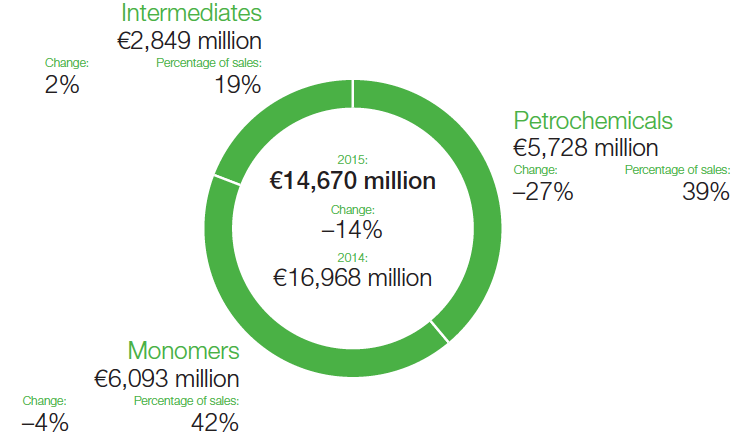Segment profile
The Chemicals segment consists of the Petrochemicals, Monomers and Intermediates divisions. In our integrated production facilities – our Verbund – we produce a broad range of basic chemicals and intermediates in Europe, Asia, North America and South America for our external and internal customers.
Divisions
Petrochemicals
Broad range of basic products and specialties for sectors such as the chemical and plastics industries
Monomers
Isocyanates and polyamides as well as inorganic basic products and specialties for various branches, such as the plastics, automotive, construction and electronics industries
Intermediates
Most comprehensive intermediates portfolio in the world, including precursors for coatings, plastics, textile fibers and crop protection products
Sales

How we create value – an example
Sulfuric acid for the electronics industry
Ultrapure cleaning chemical for microchip production
Value for BASF
8%
Expected annual sales growth for this application through 2025
Value for our customers
7-fold
Greater speed in computer chips
As a cleaning chemical, sulfuric acid plays a critical role in the electronics industry when it comes to producing microchips. The product’s increased purity reduces deposits to the point that very fine structures can be created. Our sulfuric acid provides a level of purity 20 times higher than existing standards. We expect annual sales growth in this application of 8% through 2025.
Semiconductor manufacturing companies are constantly competing to develop even higher-performance computer chips for electronic devices. BASF’s sulfuric acid is so ultrapure that, for the first time, our customers can produce surface patterns on a 10-nanometer scale – that is, 10,000 times thinner than a human hair. This allows for chips that are 7 times faster and 2.5 times more energy efficient than today’s usual 22-nanometer scale.
Strategy
- Integrated production facilities form core of Verbund
- Technology and cost leadership provide most important competitive edge
With our production facilities, we form the core of the Verbund structure and supply BASF’s segments with basic chemicals for the production of downstream products. We add value with innovations in processes and production, and invest in future markets to ensure the growth of the entire BASF Verbund. As a reliable supplier, we market our products to customers in downstream industries. We continually improve our value chains and are expanding our market position – particularly outside Europe – with new processes and technologies, as well as through investments and collaborations in future markets.
We invest in research and development in order to develop new technologies and to make our existing technologies even more efficient. Cost leadership and a clear orientation along individual value chains are among our most important competitive advantages. We concentrate on the critical success factors of the classical chemicals business: making use of economies of scale, the advantages of our Verbund, high capacity utilization, continuous optimization of access to raw materials, lean processes, and reliable, cost-effective logistics. Furthermore, we are constantly improving our global production structures and aligning these with regional market requirements.

